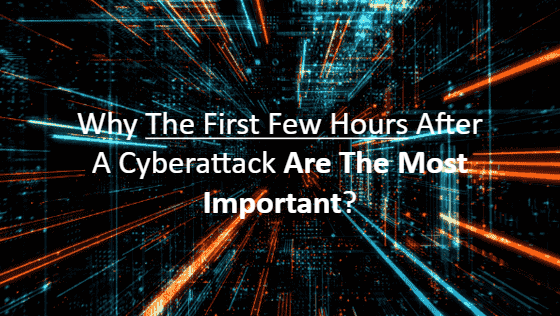Why The First Few Hours After A Cyberattack Are The Most Important?
In case of a data breach, it’s crucial to limit its effects as soon as possible. Each delay increases the chances of evidence being lost and decreases the chances of a cybercriminal being caught. The longer it takes your staff to notice and react to a cyber-attack, the higher its severity.
Time is of the essence.
In case of a successful cyber-attack, what you do in the first few hours after the attack can either save or break your business.
Living in a state of perpetual concern can be beneficial to the security of your organization. Former Intel CEO Andrew Grove once stated that “only the paranoid survive”. So, knowing all you can about possible future attacks and your organization’s vulnerabilities will help you understand how you need to prepare.
Just imagine that a hacker has remotely attacked your organization with a trojan that allows him to easily extract business data. With network monitoring and modern security controls in place, this incident can be detected and mitigated before it causes too much damage. However, if your business lacks a proper incident response plan, or simply doesn’t have enough visibility into its network, hackers are able to irreparably compromise your business.
Left unchallenged, cyber criminals can steal as much data as they desire.
You need a comprehensive crisis response plan to cover as many scenarios as possible.
It is imperative to have security protocols in place for logging, documenting, and reviewing the incident. This includes information about the incident (time of occurrence, type) actions taken to mitigate the incident, compromised systems etc. It should be crystal clear to anyone reviewing your documentation what happened and what your designated staff did in response.
You need a communication plan.
Communication during any crisis is paramount. Pre-approved messaging templates can be useful allowing employees to share information about the incident and avoid getting stuck with copywriting and approvals.
Also, you should implement a dedicated communications system which has no connection to your day-to-day business operations.
You need to prioritize.
Do I have a backup that hasn’t been destroyed? Which system do I need to rebuild first? How do I restore from a backup if my systems are compromised? Where are the encryption keys for that backup?
It is crucial for C-level executives to work closely with the IT department to highlight the priorities of what the business needs to stay operational. This could include a document management system, the email service, the financial system etc. Not all systems can have top priority in recovery.
Recover fast.
Once you identify a priority, it is important that all required staff focus on the restoration process one problem at a time.
For almost every system, there are several dependencies or other systems your team needs to rebuild first. For instance, dependencies for an email service could include several email servers, DNS servers, an Active Directory server, a desktop or remote active sync that can connect to retrieve emails and so on.
Reduce risk factors.
You need to know for sure why your systems went down. Not fully understanding the root cause may put your business in the same difficult situation few moments later as you reinstate systems back onto the network.
Layering the security controls and mitigations with consecutive levels of protection will minimize the risk of a successful cyberattack hence preventing critical data leaks.
Also, when it comes to risk, don’t forget about your employees. It’s not just the technology and business operations. Staff will be working hard, and you need them to be security aware more than ever before. Employee security training is crucial.
Bottom line.
Unfortunately, cybercriminals are difficult to identify and even more difficult to prosecute. While it’s certainly true that a quick response increases the chances of a successful criminal investigation, the chances that such an investigation will come to a dead end are even higher.
At the end of the day, the most important element of how quickly your business reacts and recovers after a cyberattack is your staff.
The above aside, the best thing you can do is to practice good security hygiene. Strong access controls and monitoring tools are mandatory.
For more information on how we can help your business prepare for, respond to, and recover from a disruptive cyberattack, please visit our IT security services page and feel free to contact us.




Thanks a lot!